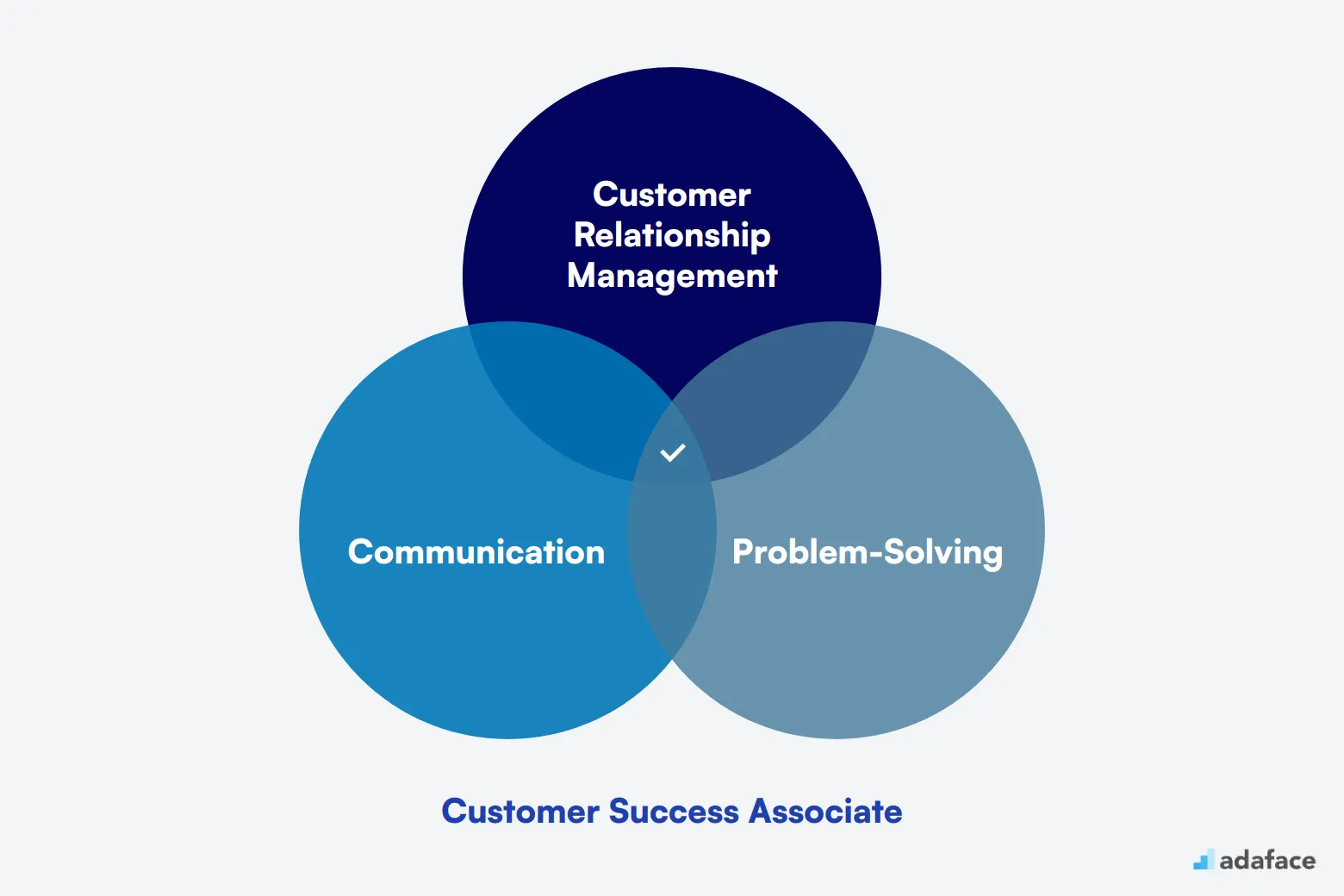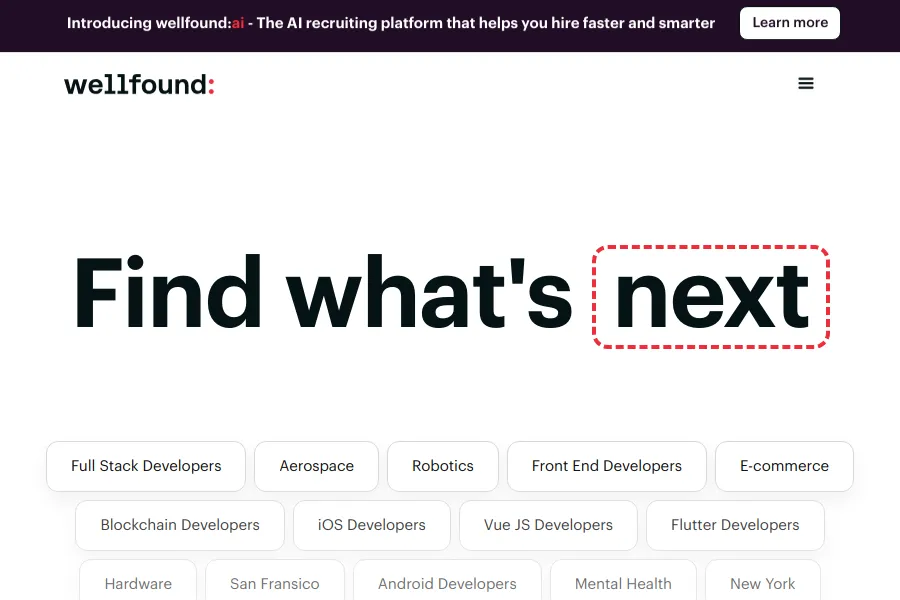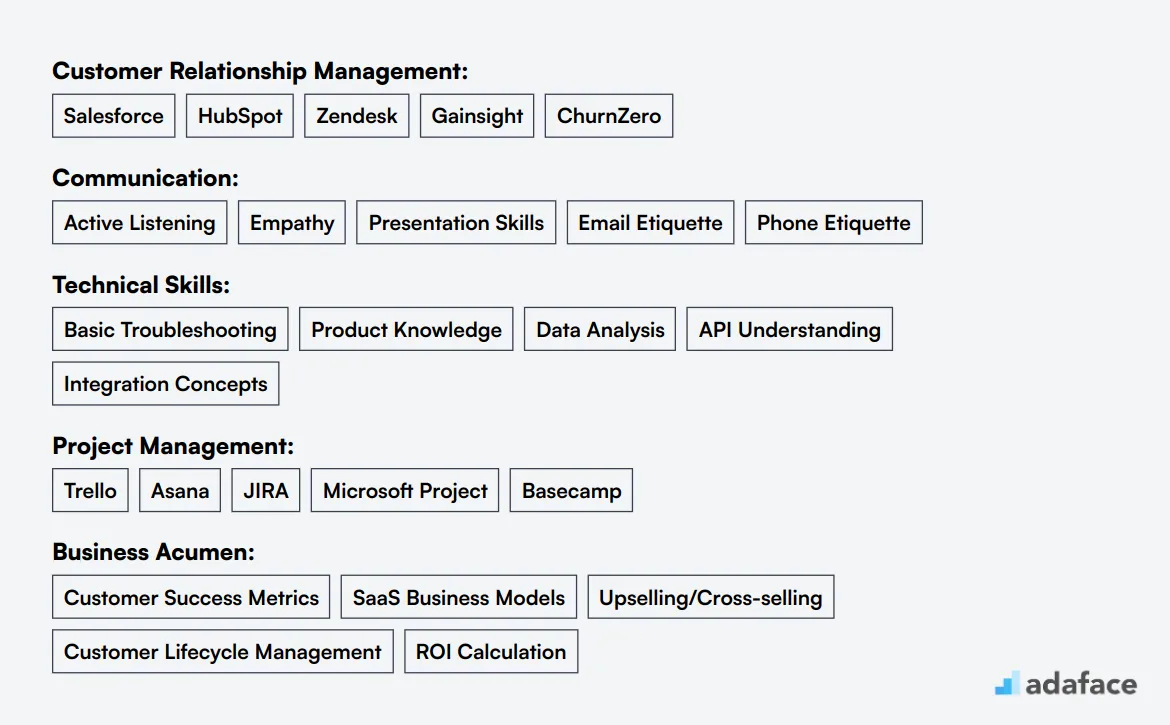Hiring a Customer Success Associate is a key move for companies aiming to boost customer satisfaction and retention. Many recruiters overlook the nuanced skills required for this role, often confusing it with traditional customer support. The ideal candidate needs a blend of relationship-building prowess, product knowledge, and strategic thinking to proactively drive customer value.
This comprehensive guide will walk you through the process of identifying, attracting, and selecting top-notch Customer Success Associates. We'll cover everything from crafting an effective job description to conducting insightful interviews. For a deeper dive into specific skills to evaluate, check out our detailed breakdown of Customer Success Associate skills.
Table of contents
Why Hire a Customer Success Associate?
Hiring a Customer Success Associate can be a game-changer for businesses looking to improve customer satisfaction and retention. Start by identifying specific challenges in your customer relationships, such as high churn rates or low product adoption.
Consider hiring a Customer Success Associate when you notice:
- Increasing customer complaints or support tickets
- Declining customer satisfaction scores
- Missed upselling or cross-selling opportunities
If you're unsure about committing to a full-time hire, consider starting with a customer success skills assessment to evaluate potential candidates. This can help you gauge the impact a dedicated Customer Success Associate could have on your business before making a long-term commitment.

What does a Customer Success Associate do?
A Customer Success Associate is responsible for ensuring that customers achieve their desired outcomes while using a company's product or service. They act as a bridge between the company and its clients, fostering strong relationships to ensure customer satisfaction and retention.
Day-to-day tasks of a Customer Success Associate include:
- Engaging with customers to understand their needs and ensure they are getting the most out of the product.
- Providing technical support and troubleshooting issues or concerns that customers may face.
- Monitoring customer accounts and identifying opportunities for upselling or cross-selling additional products.
- Working closely with other teams to escalate and resolve customer issues promptly.
- Collecting customer feedback and collaborating with the product team to enhance the user experience.
For a comprehensive list of skills required for this role, you can refer to our skills assessment tools to better understand key competencies.
Key Skills and Qualifications for a Customer Success Associate
Hiring the right Customer Success Associate can be tricky because the desired skills may vary significantly between companies. While some organizations may prioritize technical knowledge, others might focus more on communication and relationship management. It's important to distinguish between what is strictly required and what is merely preferred.
To help you build the ideal candidate profile, we've outlined key skills and qualifications to look for. This will ensure you find a candidate who not only fits the role but also aligns with your company's goals.
| Required skills and qualifications | Preferred skills and qualifications |
|---|---|
| Bachelor's degree in Business, Communications, or related field | Experience in SaaS or technology industry |
| 1-3 years of experience in customer service or account management | Knowledge of customer success metrics and KPIs |
| Excellent verbal and written communication skills | Familiarity with project management tools |
| Strong problem-solving and analytical abilities | Multilingual capabilities |
| Proficiency in CRM software and MS Office suite | Experience with data analysis and reporting |
How to write a Customer Success Associate job description?
Once you've defined your ideal candidate profile, the next step is to articulate that in a compelling job description. A well-crafted JD will help you attract the right talent for your Customer Success Associate position.
- Highlight key responsibilities and impact: Clearly outline the daily tasks and objectives of the role. Include how these responsibilities contribute to customer satisfaction and retention, as this will appeal to candidates who value impactful work.
- Balance technical skills with soft skills: While it’s important to mention qualifications like CRM software proficiency, don’t underestimate the significance of soft skills. Attributes such as empathy and problem-solving are crucial for fostering strong customer relationships.
- Showcase your company’s and the role's unique selling points: Detail what makes your company special—be it a dynamic environment, innovative products, or growth opportunities. This not only attracts candidates but also helps set the right expectations about the role.
Top Platforms to Find Customer Success Associates
Now that you have a well-crafted job description, it's time to list your Customer Success Associate position on job platforms to attract qualified candidates. Choosing the right platforms can significantly impact the quality and quantity of applications you receive. Let's explore some of the best options available.
LinkedIn Jobs
Ideal for hiring full-time Customer Success Associates due to its professional network and comprehensive profiles.

Indeed
Extensive job listing platform suitable for full-time positions with a large job seeker audience.

AngelList
Best for startups looking to hire Customer Success Associates due to its focus on new and growing companies.

Other notable platforms include FlexJobs for remote positions, Upwork for freelance talent, and SimplyHired for part-time roles. Remote.co specializes in remote customer service jobs, while Built In caters to tech companies. Monster offers a wide reach for various employment types. Consider using a mix of these platforms to create a diverse candidate pool and find the perfect Customer Success Associate for your team.
How to Screen Customer Success Associate Resumes?
Resume screening for a Customer Success Associate role is a smart way to narrow down candidates before investing time in interviews. Given the number of applications you might receive, it's practical to have a strategy in place to identify potential fits early on.

Start by identifying the key keywords to look for in resumes. For this role, consider skills and qualifications such as proficiency in CRM software like Salesforce or HubSpot, strong communication abilities, and experience with customer success metrics. Manually screen resumes to shortlist those with these keywords, ensuring they align with your requirements.
Alternatively, leverage AI tools like Large Language Models (LLMs) to streamline the screening process. These tools can highlight resumes that match your keyword criteria. They assist in quickly filtering through large volumes of resumes, thus saving you both time and effort.
Here's a prompt example for using AI to screen resumes for this role:
TASK: Screen resumes to match job description for Customer Success Associate role
INPUT: Resumes
OUTPUT: For each resume, provide following information:
- Email id
- Name
- Matching keywords
- Score (out of 10 based on keywords matched)
- Recommendation (detailed recommendation of whether to shortlist this candidate or not)
- Shortlist (Yes, No or Maybe)
RULES:
- If unsure about a candidate's fit, put the candidate as Maybe instead of No
- Keep recommendation crisp and to the point.
KEYWORDS DATA:
- CRM Software (Salesforce, HubSpot)
- Communication skills (Active Listening, Empathy)
- Business Acumen (Customer Success Metrics, SaaS Business Models)
Recommended Skills Tests to Screen Customer Success Associates
Skills tests are a great way to evaluate potential Customer Success Associates as they offer an objective measure of candidates' capabilities beyond their resumes. Here are our top recommendations for skills tests that will help ensure you find the right fit for your team.
Customer Success Online Test: This test evaluates the proficiency of candidates in key areas such as customer orientation and relationship management, which are fundamental for a Customer Success Associate.
Customer Service Aptitude Test: Assess how well candidates are likely to handle customer interactions with this test. It focuses on problem-solving and empathy, which are necessary for maintaining client satisfaction.
Communication Test: Clear and effective communication is important in customer success roles. This test measures a candidate's ability to convey ideas and information effectively, ensuring they can communicate well with clients and colleagues.
Critical Thinking Test: This test helps identify candidates who can analyze situations and make informed decisions, an important aspect of solving customer issues and improving overall customer experience.
Situational Judgement Test: Measure how candidates might respond to various work-related scenarios. This test is designed to evaluate decision-making skills in situations they are likely to encounter in a customer-facing role.
Case Study Assignments to Evaluate Customer Success Associate Candidates
Case study assignments can be valuable tools for assessing Customer Success Associate candidates. However, they come with drawbacks like lengthy completion times, lower participation rates, and the risk of losing qualified candidates. Despite these challenges, well-designed case studies can offer insights into a candidate's problem-solving skills and customer-centric approach.
Customer Onboarding Scenario: Present candidates with a mock customer onboarding situation. Ask them to create an onboarding plan, addressing potential challenges and outlining steps to ensure customer satisfaction. This case study helps evaluate their ability to streamline processes and anticipate customer needs.
Churn Prevention Strategy: Provide candidates with data on a fictional customer at risk of churning. Task them with analyzing the situation and developing a retention strategy. This exercise assesses their analytical skills and ability to create actionable plans to improve customer retention.
Product Adoption Challenge: Give candidates information about a customer struggling with product adoption. Ask them to devise a plan to increase feature usage and overall satisfaction. This case study helps gauge their product knowledge, communication skills, and ability to drive customer value.
How to Structure the Interview Stage for Hiring Customer Success Associates
After candidates pass the initial skills tests, it's time to move them to the interview stage where their practical abilities are assessed. While skills tests are useful for filtering out unqualified candidates, interviews are necessary for identifying the best fit for the role. This stage is crucial for evaluating the candidate's ability to handle real-world scenarios, interact with customers, and align with your company's culture and goals.
Here are some sample interview questions to consider: 1. How do you handle difficult customer situations? This question assesses their problem-solving skills and ability to maintain composure. 2. Describe a time you turned an unhappy customer into a satisfied one. It gauges past experience in customer success roles. 3. What strategies do you use to prioritize customer issues? This question helps understand their organizational skills and time management. 4. How do you measure customer success? It explores their understanding of key metrics. 5. Can you give an example of working collaboratively with other teams? This highlights teamwork abilities, which are crucial in customer success roles. For additional insights, explore customer success interview questions.
What's the difference between a Customer Success Associate and a Customer Support Specialist?
Many people confuse Customer Success Associates with Customer Support Specialists due to their similar focus on customer interactions. However, these roles have distinct responsibilities and objectives within an organization.
Customer Success Associates are proactive relationship builders. They focus on driving customer success through onboarding, retention strategies, and long-term account management. Their primary goal is to ensure customers achieve their desired outcomes using the product or service.
In contrast, Customer Support Specialists are reactive problem-solvers. They address immediate customer issues, provide technical assistance, and manage support tickets. Their main objective is to swiftly resolve customer problems and maintain high satisfaction levels.
The skills required for these roles also differ. Customer Success Associates need strong account management and relationship-building abilities, while Customer Support Specialists require excellent technical troubleshooting and communication skills. For a deeper dive into the skills needed for customer success roles, check out our detailed guide.
When it comes to performance metrics, Customer Success Associates are often evaluated on customer retention rates and success metrics. Customer Support Specialists, however, are typically measured by resolution time and customer satisfaction scores.
Understanding these differences is crucial for recruiters and hiring managers to find the right fit for each role. By recognizing the unique aspects of Customer Success Associates and Customer Support Specialists, you can tailor your hiring process to attract candidates with the most suitable skills and experiences for each position.
| Customer Success Associate | Customer Support Specialist | |
|---|---|---|
| Focus | Proactive engagement | Reactive issue resolution |
| Objective | Drive customer success | Resolve customer issues |
| Skills Required | Account management, relationship building | Technical troubleshooting, communication |
| Primary Tasks | Customer onboarding, retention strategies | Addressing support tickets, technical assistance |
| Key Performance Indicators | Customer retention rate, success metrics | Resolution time, customer satisfaction |
| Tools Used | CRM platforms, customer analytics tools | Help desk software, knowledge bases |
| Interaction Level | Long-term relationship planning | Immediate problem-solving |
| Typical Background | Customer relationship management, sales | Technical support, IT help desk |
What are the ranks of Customer Success Associates?
In the realm of customer success, it's common for people to confuse the roles of Customer Success Associates with other positions. Understanding the hierarchy and distinct responsibilities within this field can clarify the career path for potential candidates.
• Customer Success Associate: This is typically an entry-level position focused on assisting customers with onboarding and ensuring they receive value from the product. They handle day-to-day inquiries and support minor issues, acting as the frontline for customer interaction.
• Customer Success Manager: The next step up, Customer Success Managers take on more responsibility. They focus on building relationships with clients, strategizing on account growth, and ensuring customer satisfaction at a deeper level. They often handle escalated issues and play a key role in retention efforts.
• Senior Customer Success Manager: In this role, professionals oversee a larger team of Customer Success Associates and Managers. They are responsible for high-level strategy and may work directly with key accounts to maximize their satisfaction and loyalty.
• Director of Customer Success: This leadership role involves overseeing the entire customer success department. Directors set the vision and strategy for customer engagement, while also collaborating with other departments to align on goals and objectives.
• Vice President of Customer Success: At the executive level, the Vice President is responsible for the overall success of the customer success strategy within the organization. They work closely with other executives to drive customer-centric initiatives and ensure that the company's mission aligns with customer needs.
Hire the Best Customer Success Associates
We've covered the key aspects of hiring Customer Success Associates, from understanding their role to crafting job descriptions and conducting effective interviews. Remember, a great Customer Success Associate can significantly impact your customer retention and satisfaction rates.
The most important takeaway is to use accurate job descriptions and skills assessments to ensure you're hiring the right fit for your team. Consider using a Customer Success online test to evaluate candidates objectively and identify those with the best potential to excel in this role.
Customer Success Test
FAQs
While both roles interact with customers, Customer Success Associates focus on proactively driving customer value and retention, whereas Customer Support Representatives typically react to and resolve customer issues as they arise.
Key skills include excellent communication, relationship-building abilities, problem-solving, product knowledge, data analysis, and a proactive mindset. You can assess these skills using our Customer Success online test.
LinkedIn, job boards specializing in customer success roles, industry-specific job sites, and referrals from current employees are all excellent sources for finding qualified candidates.
Look for candidates with a track record of improving customer satisfaction, experience with CRM software, and a history of meeting or exceeding KPIs. Pay attention to their ability to articulate customer success stories and metrics.
Focus on situational and behavioral questions that assess their problem-solving skills, ability to handle difficult customers, and proactive approach to customer success. Our Customer Success Associate interview questions can provide more specific examples.
Use role-playing exercises or case studies that simulate real customer scenarios. This will allow you to evaluate their communication style, problem-solving approach, and ability to remain calm under pressure.
Familiarity with CRM systems, customer success platforms (like Gainsight or ClientSuccess), data analytics tools, and project management software is beneficial. The specific tools may vary based on your company's tech stack.

40 min skill tests.
No trick questions.
Accurate shortlisting.
We make it easy for you to find the best candidates in your pipeline with a 40 min skills test.
Try for freeRelated posts
Free resources



